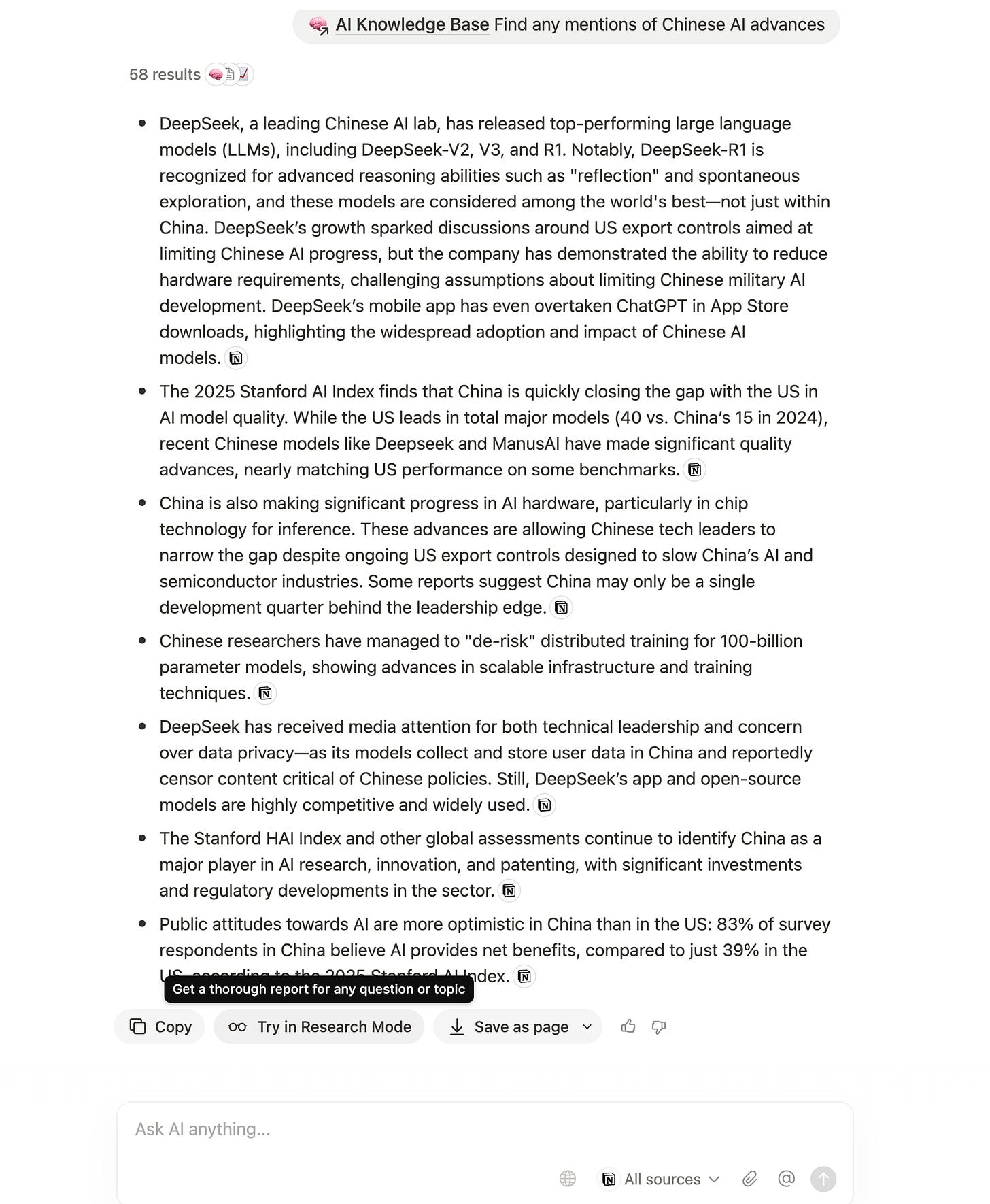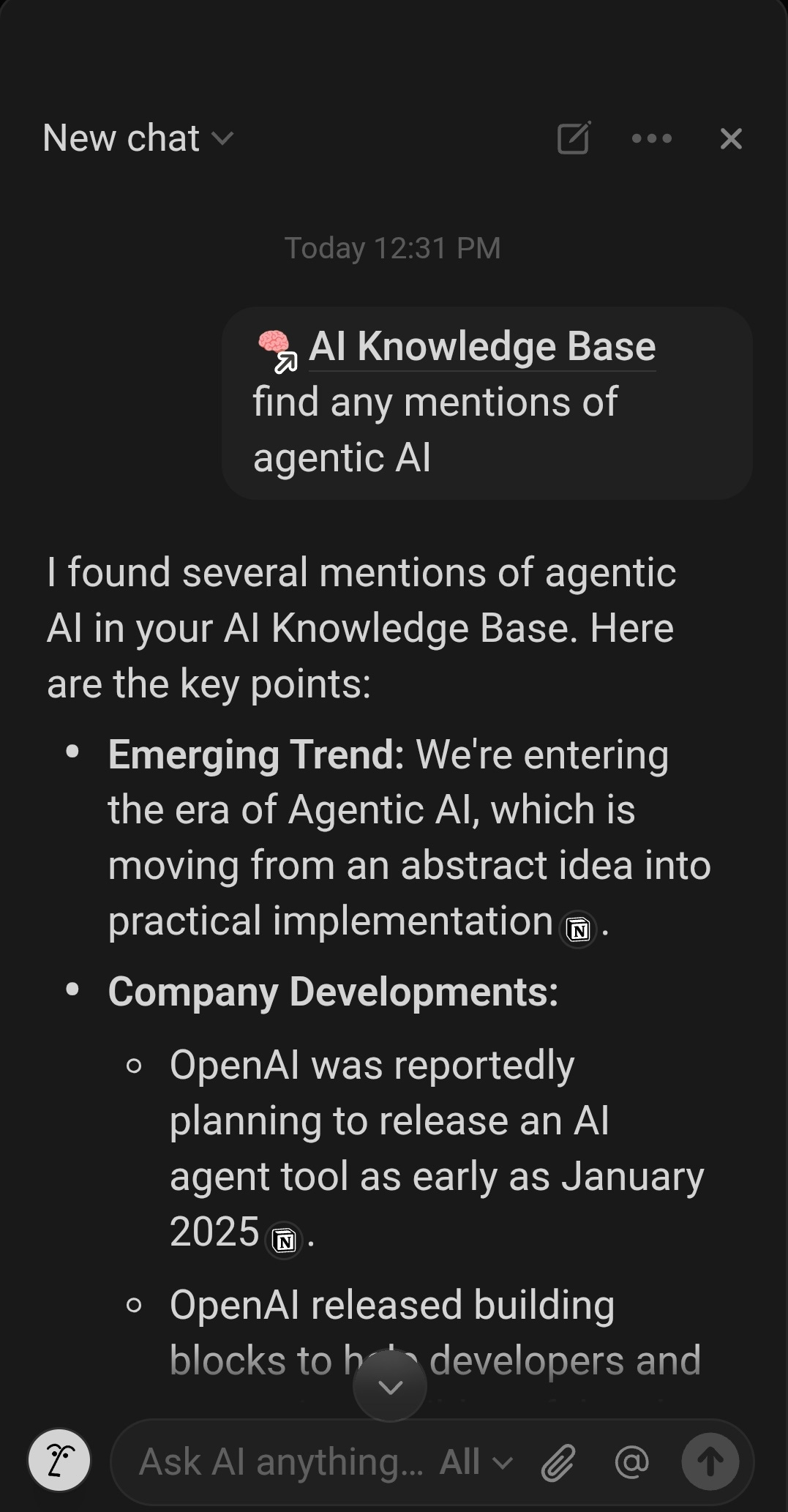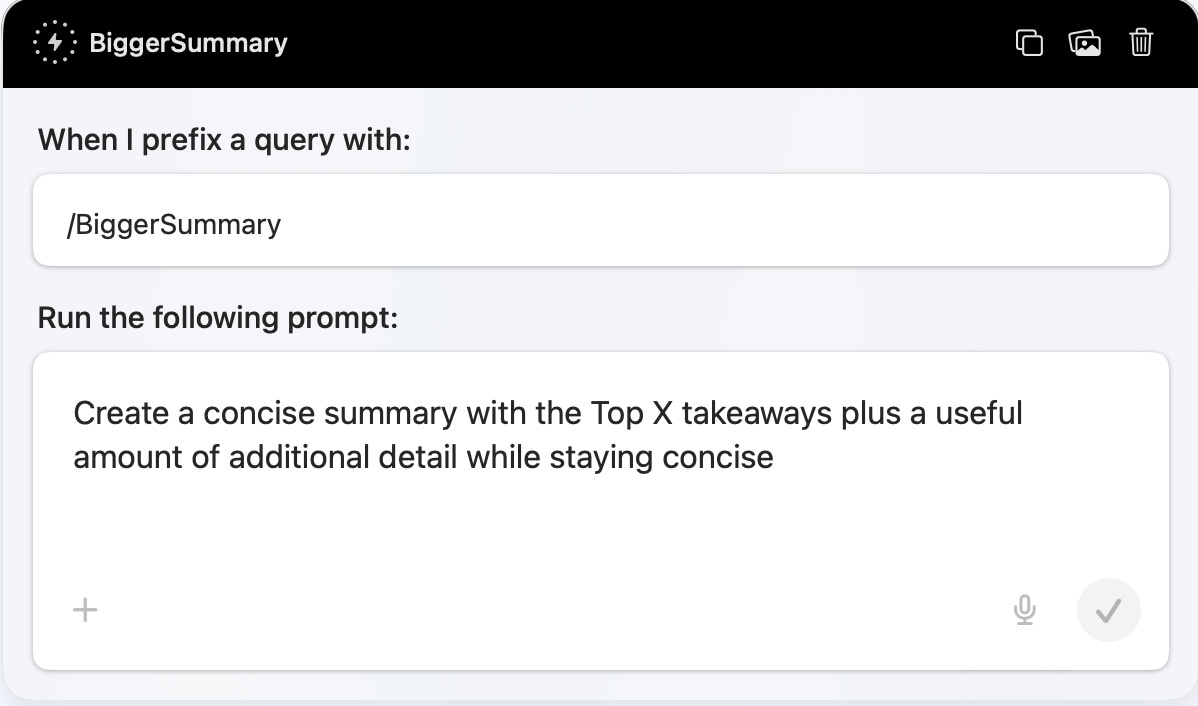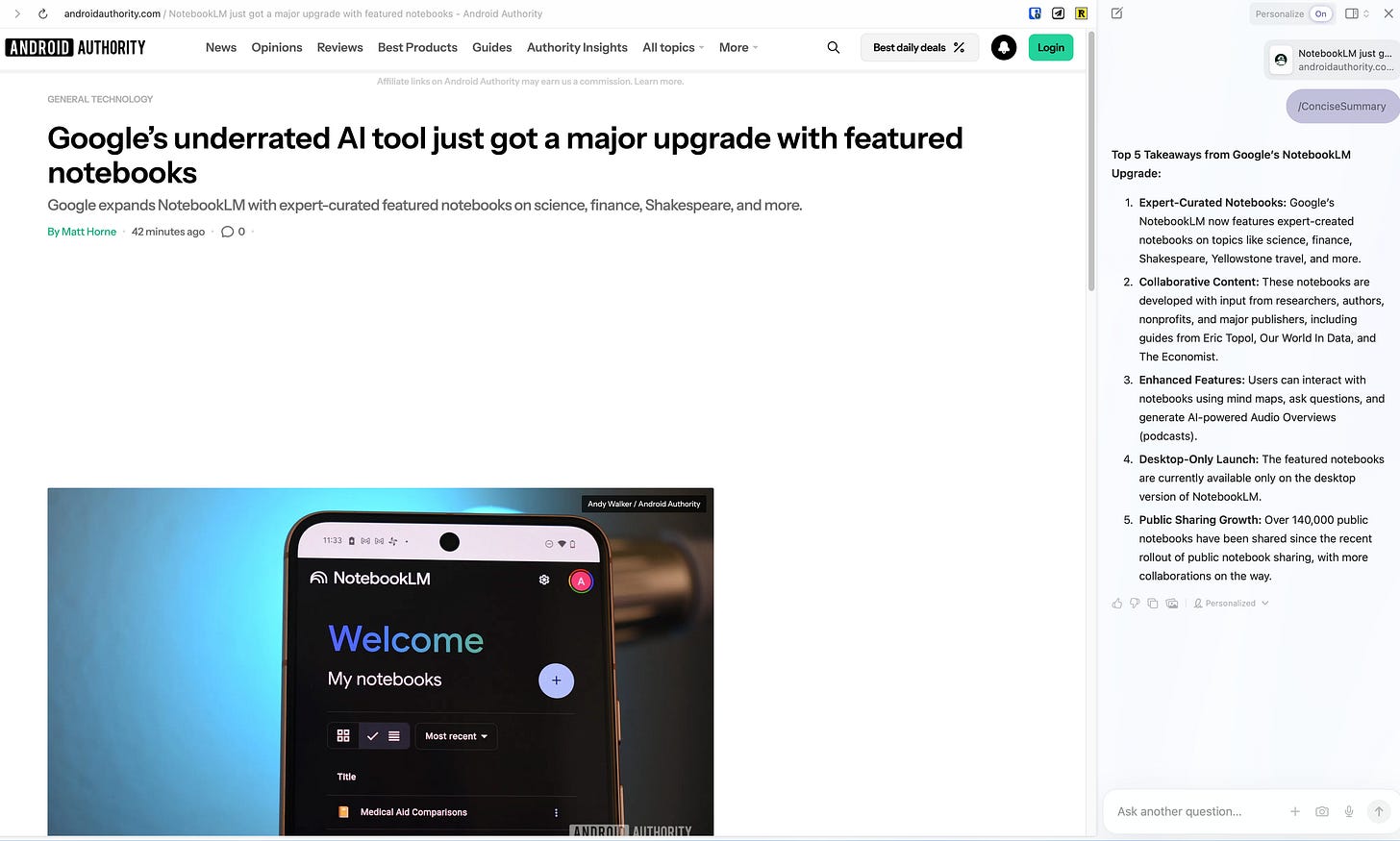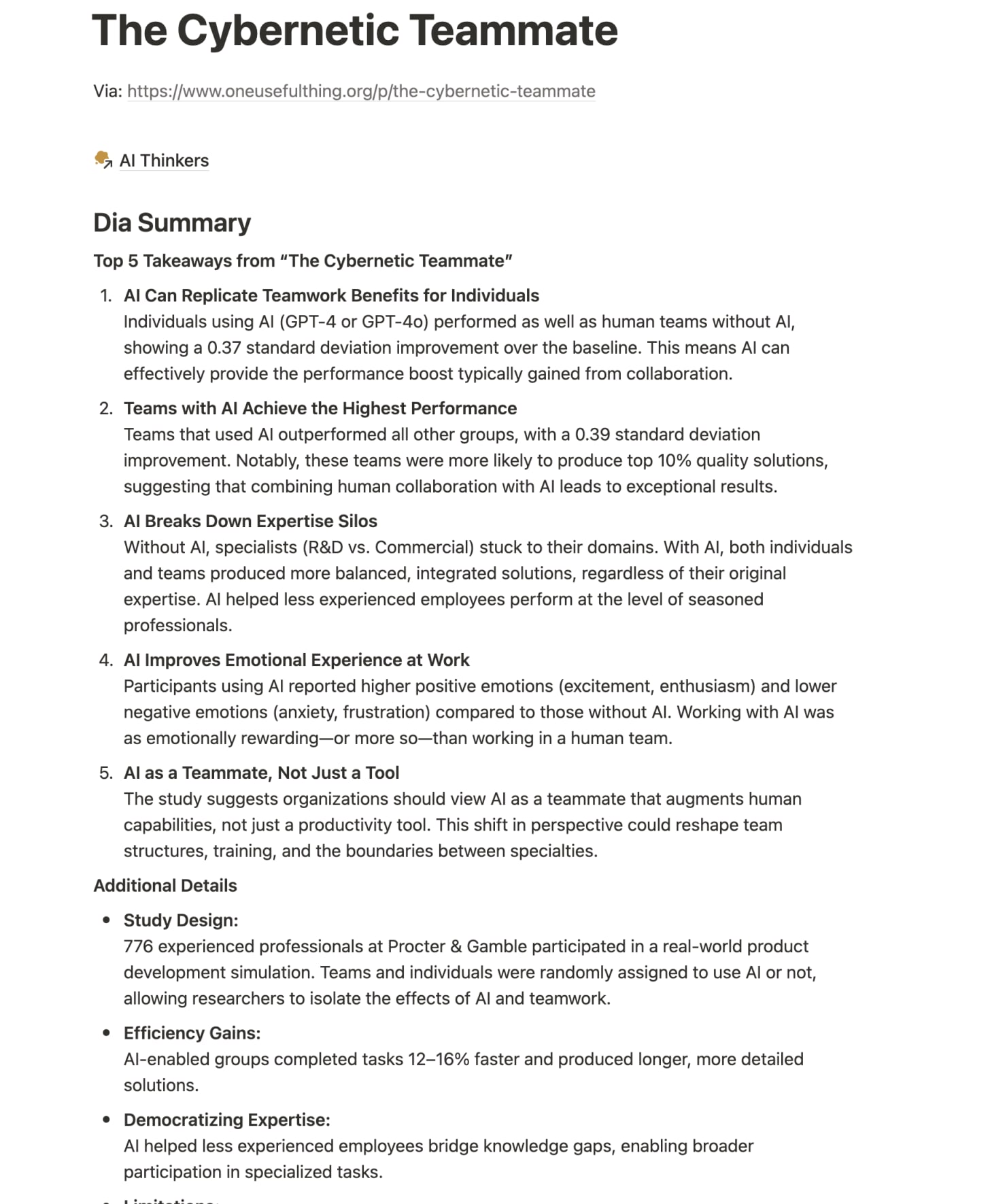The Old
That’s Notion AI wishing me a good afternoon right up there ^^^. Notion, and it’s AI that I described as sneaky great at the beginning of the year, are The Old in the context of the post title. I’ve been using Notion for years. It’s a big, feature rich beast and over time I’m getting more and more use out of it. Most recently that’s due to one of its many collaboration features, Teamspaces, and the continuing theme of finding Notion AI to be not just sneaky great anymore, but more like consistently, use it every day great.
Last week a Notion update added several cool features for Notion databases - one I like the sound of is a new ‘Feed’ view, which the update email describes as “Like turning your database into a blog feed!”. My favorite new feature is one that makes using Notion AI and databases even better - ‘Chat with your database in research mode’, which Notion describes like so:
Now Notion AI can answer extra-complex questions about your databases, drawing info across properties and any notes inside your database pages. For example, “Which accounts in @Sales CRM have call notes that mention European data residency?”
Here are a couple of quick examples while trying this out today where I @ reference my AI Knowledge Base database, on desktop …
And on mobile:
The New
The new is an AI browser called Dia, one of the browsers that is listed when M.G. Siegler at Spyglass and The Neuron talk about the “AI browser wars” that have begun. It’s from The Browser Company, creators of the (now sidelined into maintenance mode) Arc Browser. A little slice of how they describe it:
An AI-first, context-aware browser—one where your assistant is integrated into every aspect of browsing (searching, summarizing, shopping, drafting, planning)—all wrapped in a familiar, polished, privacy-oriented interface.
It’s currently in a restricted beta mode, with access for Arc users. I have been an Arc user, so I’ve been able to start giving Dia a try today. My early (early!, just a few hours) impressions of Dia are good. I’m in the camp that thinks AI web search, that delivers answers to specific questions and prompts, is already far better than traditional web search, so I’m keen to take Dia and at least one other browser wars combatant (from OpenAI) for a drive.
I’ve only gone as far as testing out the ‘Chat with tabs’ feature so far, but it seems to be a core feature and one I’m definitely interested in, so not a terrible place to start. Things to like about it:
It’s easy to invoke with a Command-E keyboard shortcut on a Mac top open it in a sidebar or ‘floating’. I much prefer the sidebar. It’s Mac only at this point, by the way.
Once it’s open you have options for Chat, Write, Code, and to “Add New Skill”.
It’s super easy to add new custom skills that can be invoked with just a / once you invoke Chat.
I’ve created two very basic new skills. One gets me a concise summary of what’s on the tab I’m on, and the other gets a concise summary with additional details. Here’s how easy it is to create these - this is all I did for the second one with concise additional details:
And here’s what the result looks like for a tab that has a great article from Anthropic - makers of Claude AI - on the need for transparency in Frontier AI:
Here’s one with the conciser concise :) summary for some interesting Android news, where you can see the /ConciseSummary skill command.
Finally, here’s the Dia + Notion peanut butter + chocolate moment where I like placing the Dia summary at the top of a Notion note along with the link to the full article I took the notes on, and then all of my notes down below the summary.
So, again crazy early take, but I think if Dia proves to be stable and works well in general browser ways I can see some time saving potential using Chat and skills and nicer way to interact with web pages.
Have any of you tried Dia? What do you think of AI web search vs traditional? If any of you would like an invite to Dia let me know. I’m not sure how many invites I have, but I know I at least have one :)
UPDATE
I should have mentioned, the security features for Dia seem decent as well:
Data Handling and Storage:
Local Encryption: Chats, Browse history, bookmarks, Browse context, and files are encrypted and stored locally on your device.
Minimal Data Sent to Servers: When you interact with Dia's AI (e.g., asking a question in chat), only the data strictly relevant to that request is sent off your device to a search engine or trusted AI partner.
No Data Retention by Partners: Dia states that its partners are under contract not to store or train their models on your data once your request is complete.
Sensitive Site Avoidance: Dia aims to avoid storing and processing data from sensitive sites like banks or healthcare providers.
Deletion Control: You can delete your chats, files, and history, and they are reportedly gone for good. Incognito mode ensures nothing is stored.
Content Data: If you choose to share content data with Dia (for product improvement), it's not tied to your profile and is deleted after 30 days. When processed on their servers, they only see the data itself, not who sent it.
No Data Sale: Dia explicitly states they will never sell your personal data.



